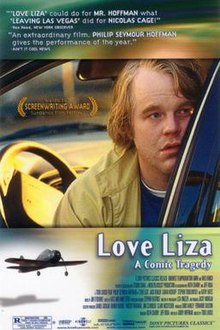Love Liza
| Love Liza | |
|---|---|

Movie poster
|
|
| Directed by | Todd Louiso |
| Produced by |
Ruth Charny Chris Hanley Corky O'Hara Jeffrey Roda Fernando Sulichin |
| Written by | Gordy Hoffman |
| Starring |
Philip Seymour Hoffman Kathy Bates |
| Music by | Jim O'Rourke |
| Cinematography | Lisa Rinzler |
| Edited by | Ann Stein |
| Distributed by | Columbia TriStar, Sony Pictures Classics |
|
Release date
|
|
|
Running time
|
90 minutes |
| Country | France Germany United States |
| Language | English |
Love Liza is a 2002 American comedy-drama film directed by Todd Louiso and starring Philip Seymour Hoffman, Kathy Bates, Jack Kehler, Wayne Duvall, Sarah Koskoff and Stephen Tobolowsky.
Wilson Joel's (Philip Seymour Hoffman) wife Liza (Annie Morgan) has, for an unexplained reason, committed suicide. Wilson one night discovers a sealed letter from his wife, which he believes to be her suicide note. In his grief-stricken state and with the added stress of finding the letter, which he cannot bring himself to open and read, he forms an addiction to inhaling gasoline fumes (“huffing”).
In order to hide his addiction from a work colleague, he informs her that the petrol smell in his house is from his hobby of flying remote controlled planes. To try to engage an ever-distant Wilson, she asks her brother-in-law, Denny (Jack Kehler), a radio control (RC) hobbyist, to visit Wilson. With the knowledge of an impending visit from Denny, Wilson heads down to the local RC hobbyist shop to buy himself a plane. He also stocks up on some RC fuel to fill his plane and feed his addiction. Out of this lie, a very unusual friendship forms between Wilson and an energetic Denny.
His mother-in-law (Kathy Bates) tries her best to help Wilson and deal with her own loss at the same time. She becomes increasingly anxious to know the contents of the letter.
In Order Of Appearance
Much of the film was shot in Mobile, Alabama.
Jordan Hoffman of Vanity Fair noted the way the film "tackled depression and substance abuse in a dark-as-hell comedy that takes on an additional layer of sadness [after Hoffman's death]". Rex Reed of the New York Observer praised Hoffman's performance, believing that it could have the same kind of impact on his career as Leaving Las Vegas had for Nicolas Cage. However, A. O. Scott of The New York Times stated that Hoffman's "omnipresence is something of a mixed blessing", given that the protagonist is "more a state of feeling than a character".
...
Wikipedia
